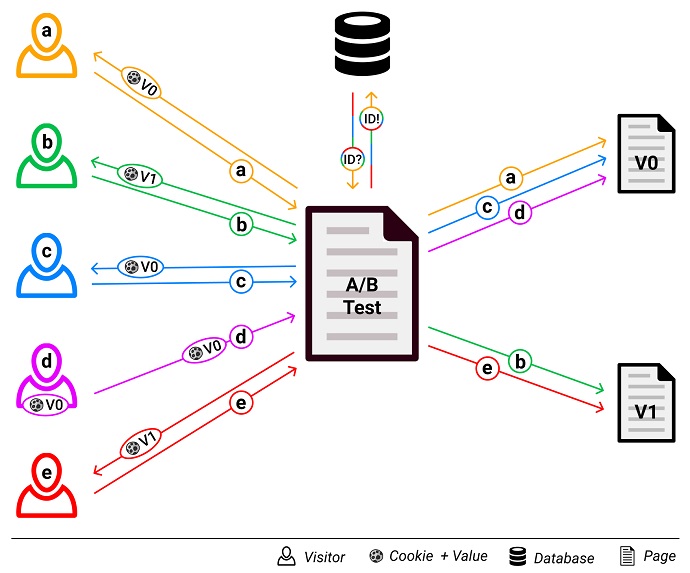This extension provides a new page type to evenly split up visitor traffic between the selected test-pages. At the same time it makes sure that returning visitors will be shown the same page they have visited before.
This way A/B tests can be performed in Contao Open Source CMS.
- Select one or more pages to be tested
- test pages are rendered within the the new page type so all versions have the same url
- Set a cookie and its' expiring time to identify returning visitors
- adds a new Content Element to set a Matomo Custom Variable easily
This extension doesn't provide analytics! To get insights on statistics of your visitors you will need to use an analytic software like Google Analytics, Matomo or similar.
The visitor flow is visualized in the graphic above and shows how the extension works.
- Visitor a is the first visitor to our A/B test. The A/B test page checks which test-page was last visited by any visitor. Since visitor a is the first visitor there will be no result and a will be rendered the first of the test-pages V0.
- Visitor b is the second visitor. Checking which page was rendered before will now return the ID of test-page V0. Therefore visitor b will be given the second test-page V1.
- When visitor c visits our A/B test the check of the last visited page will return the ID of the second page V1 since the last visitor was shown this one. Visitor c will therefore be rendered test-page V0 again as V1 was the last page in the test.
- Visitor d is a returning visitor. He visited the A/B test before and was given V0. By this time a cookie was saved on his device containing the value of the test-page he got to see. On the returning visit the A/B test checks if the cookie exists and if so gets its' value and renders the same page he has seen before. In this case this will also be V0 although the next page to be visited would be V1 again (if it wasn't a returning visitor). Additionally the last visited pge won't be saved in the case of returning visitors so the regular visitor order won't be messed up.
- Visitor e is a first time visitor, has no cookie with a page ID value and therefore triggers the check of the last visited page which returns the ID of page V0 (visitor c was the last one to visit it). Therefore visitor e will be shown test-page V1.
